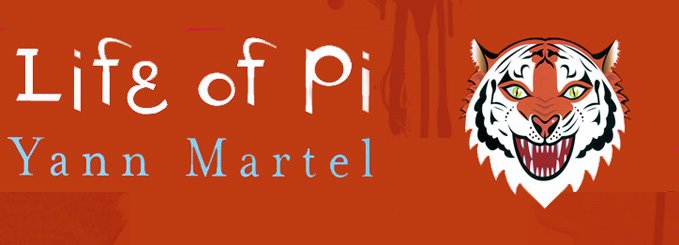The concluding section of “Life of Pi” presents the reader with a scenario that is so mind boggling, so twisted, and so life changing, at least for Pi anyway, that it almost requires the reader to reread the whole novel. While being interviewed by a couple of Japanese men, representing the Ministry of Transport, Pi presents a “story without animals” (336), one in which “four [people] survived. Mother held on to some bananas and made it to the lifeboat” (337). Pi’s new version of the story forces the reader to decide whether what they had previously read, the story of the Bengal tiger and the man-eating island, was just a made up story or what actually happened. To make matters worse, both versions of Pi’s adventure seems to fit the same scenario, all he has done is change the species of his characters, “the Taiwanese sailor is the zebra, his mother is the orang-utan, the cook is . . . the hyena – which means he’s the tiger” ( 346). This presents a question to the reader, should one believe the sensational or the boring. This question creates such excitement, for me anyway, that one must almost indefinitely read this wonderful novel again.
“The lower you are, the higher your mind will want to soar” (314). At such a point in the novel, and into Pi’s adventure, Pi must face the fact that although his life has devolved into a series of small tasks, could one not say the same of all lives, he must continue performing these tasks because he is still alive. The previous statement illustrates this fact by implying that as Pi has sunk to fishing for fish, and collecting rainwater he must now look to God for his excitement. Pi is anxious to escape his reality; so he has resorted to creating his own reality, perhaps one involving tigers and islands.
If Pi’s story of being the lone human survivor of the Tsimtsum is false, and he truly did share a lifeboat with three other humans than this would further illustrate his need to make up his own reality out of something that is irrational. This seems to be the fact, as is symbolised in Pi’s name. Pi, as I am sure we all know, is a Greek letter often used to denote the ratio of the circumference of a circle to the diameter of such a circle. The number in itself is irrational as it goes on for infinity; 3.14 and the succeeding digits trail on for all of eternity. Is this perhaps a symbol, a number so large the human mind cannot comprehend, one that must be rationalised by presenting it with letter? Does Pi’s name illustrate his own need to rationalize?
This final section has answered many questions for me, although it did present one more. The major question, and in fact the initial question, ‘how on earth will this novel ever make me “believe in God” (VIII)’ was answered almost effortlessly by Martel. Pi’s need for excitement forced him to look to God. If such safety can be provided merely by believing, then can I not also receive such a blessing? If Pi’s death defying adventure was survived by such a thing, then can my simple life be completed by talking to God? According to Martel it can. This is illustrated by the fact that immediately after Pi turned to God he “reached land, Mexico to be exact” (315). If it weren’t for Pi’s love for God, for his thirst for belief, who knows how long he would have been at sea.
The theme in this final section seems to be two-parted, Pi’s great will to survive, and his love of God. Pi did everything he could to live, he gave up on vegetarianism, he gave up his family and he almost gave up on God. But alas, Pi in the end, when he could go no lower, looked to God for inspiration, and in return he saw land. If it weren’t for Pi’s love of God he would never have survived, and if he had not tried so hard to survive he would not have found God; the two themes seem to go hand in hand.
Generally, the conflicts stayed constant throughout the book. Man versus the nature, Pi was forced to face living on a lifeboat in the middle of the ocean with a tiger as a neighbour. But in this final section Pi was faced with a new conflict, man versus self. If Pi were to survive the ocean he would have to survive his mind, and his thoughts. Many better men, I am sure, would have given up long before Pi even thought of doing so, but Pi did not. This is by far the greatest conflict anyone can ever face, giving up seems to be human nature. Luckily for Pi though, he never did. When he was confronted with defeat he simply turned to the heavens, and he lived on. Pi seemed to have eternal life, and perhaps that is all that is meant by religion; when faced with adversity one must simply look to God for inspiration and he will provide. Whether or not there is a God seems to be irrelevant to Pi though, because all that he needed was hope, and that is what he received.
Now that I am finished this novel I almost miss turning to the book as a means for excitement, and a means for inspiration. I definitely look forward to reading about Pi’s adventure again, and again. It is almost unimportant whether”the story with animals or without animals” (352) is true. Pi’s adventure will always speak to me; it will always be exciting and inspirational regardless of the factual relevance. Besides, as Pi has taught, one must always have something to believe in.


